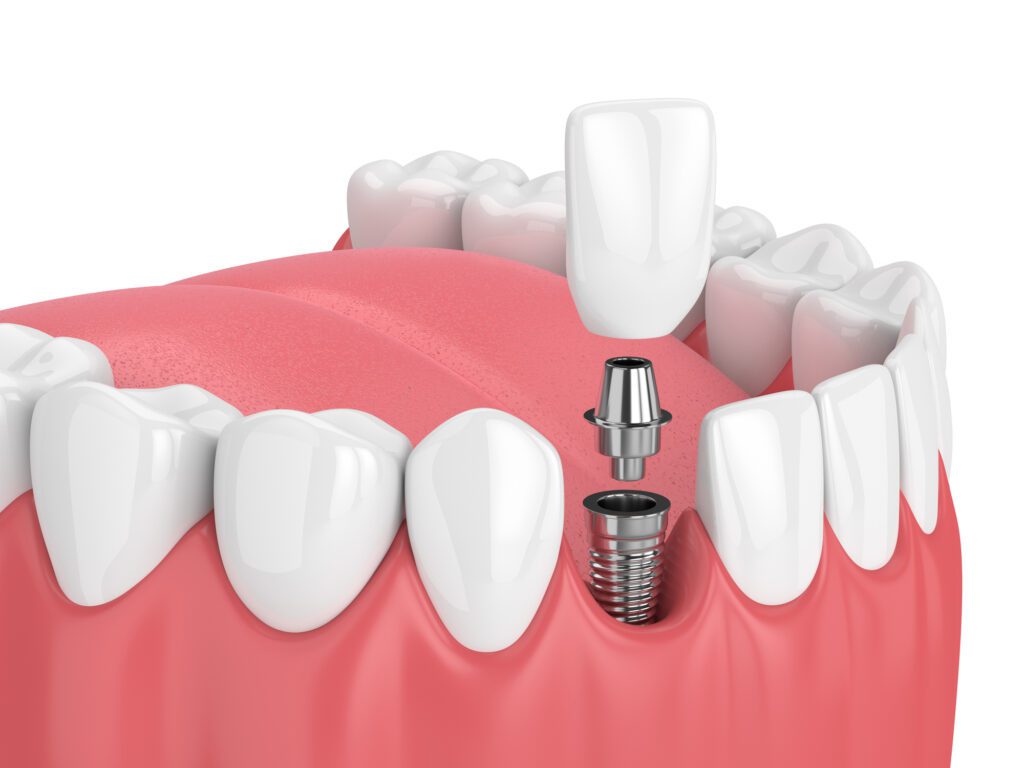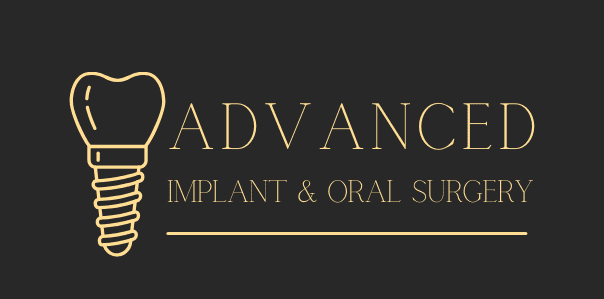Dallas, Texas, area board-certified periodontist Dr. Bradley Dean offers many types of dental implants. He can provide implant restorations for patients missing a single tooth or an entire set of teeth. Dental implants have many benefits, but most importantly, they can improve your quality of life and self-esteem.

What Are Dental Implants?
A dental implant consists of 3 parts: a small titanium post, an abutment, and a dental crown. An oral surgeon implants the titanium post into the jaw bone. The titanium post acts as a prosthetic tooth root, stimulating natural bone growth. Thus, it reduces the risk of jaw recession, a common side effect of missing teeth.
Titanium is a strong metal that the human body does not reject and easily fuses with bone. Our dentist can place one to eight implants to secure a new, custom-made dental restoration.
Dental implants have a very high success rate of over 95%. Unlike other tooth replacement options, they help avoid bone loss and gum recession. Unlike traditional dentures, implants will not cause slurred speech, slip around in your mouth, or fall out. Implants are more comfortable and come with little to no food restrictions.
Implant Dentistry in Dallas from D. Bradley Dean, DDS, MS
Dr. Dean offers many different types of dental implants in his Dallas, TX area periodontist office. These options include cosmetic dental implants, removable and non-removable implant dentures, all-on-four dental implants, and implant supported bridges.
The procedure for dental implants requires multiple visits over several months. After the comprehensive evaluation to see if you qualify for dental implants, Dr. Dean will schedule your surgery as soon as possible. Dr. Dean is licensed and has extensive training in sedation dentistry as well.
After the dental implant placement procedure, he will work very closely with your general dentist to assure you receive top quality care. If you have any questions about the dental implant process or would like more information on the cost of dental implants, please contact our office.
The Dental Implant Process
The first step to filling the gaps in your smile with dental implants is an examination and consultation with Dr. Dean at his Dallas, TX, area periodontal office. At your appointment, he will determine your options and whether you are a good candidate for dental implants.
If you do not qualify, he will help you get the treatment you need. This may involve alternative replacement teeth treatments, gum disease treatment, or bone grafting.
Next, we will schedule you for oral surgery. On the day of surgery, Dr. Dean will surgically place the dental implant posts into the jaw bone. The posts will secure the dental restoration and replace the missing tooth roots. Your mouth will need time to fuse with the implant posts. Typically, this can take anywhere from three to six months.
The last part of the process involves attaching a small connector piece, or abutment, to each post. Dr. Dean will need to uncover the posts to place the abutments.
After another brief healing period, he will finally attach your permanent dental restoration. The new restoration can be a dental crown, dental bridge, partial denture, or full implant denture. Finally, you will be able to eat and chew normally without restrictions.
Risks of Getting a Dental Implant
You should be aware of some risks when getting a dental implant. These risks usually relate to the surgery and aftercare, not the implants. How well you take care of your dental implants can manage these risks.
The most common risk is infection. This can happen if you do not properly care for the implant area or if there is an issue with the implant itself. If this happens, it can lead to other complications and, eventually, the need for another implant surgery.
Another risk is that the implant may not integrate well with your jawbone. As a result, the jaw bone cannot support the implant well enough to keep it in place. This can lead to pain and discomfort as well as the need for another surgery to remove the implant and replace it with a new one.
Other risks include:
- Gingivitis: Also known as gum inflammation, this problem is the precursor to gum disease. If you experience gum tissue death, your implants can fail.
- Jawbone Death: You are more likely to experience jawbone death if not enough bone exists in your jaw. This happens if you have a weak jaw bone structure and do not get a bone graft before treatment.
- Peri-implantitis: This inflammatory process happens at the root of the implant. Here, the soft and hard tissues deteriorate over time, causing implant failure
Proper brushing, flossing, and cleaning around the implant sites will prevent these risks. We can provide tips to care for your implants so you reduce the risk of infection, pain, and failing implants.
Answers to Your Questions About Dental Implants
Learn more about dental implants with these common patient questions:
How much do dental implants cost?
The cost of dental implants varies since each patient is different. Implant cost can depend on:
- Pretreatments
- Number of implants
- Type of restorations
We encourage you to schedule a visit so we can give you a better idea of the costs. Dr. Dean works with CareCredit and Lending Club to help you restore oral health with affordable options.
How long will a dental implant last?
If cared for properly, dental implants can last forty years to a lifetime. Consistently brush and floss, and follow treatment recommendations given by our dentist. Your genetic history, oral hygiene habits, and diet influence how long dental implants last.
Will insurance cover my dental implants?
Most dental insurance companies do not cover the surgical placement of the implant. You must contact your dental insurance provider to see how much of the dental implant procedure they will cover.
What is the best age for dental implants?
The best age to get dental implants is 18 or older. Generally, the patient’s jawbone and other surrounding teeth should be fully developed for the dental implant to succeed. Waiting until mature adulthood allows for greater success with any type of oral surgery, including the placement of tooth implants.
Can you get dental implants after having dentures for years?
Yes. Dental implants provide a more stable and long-term solution. Our dentist, however, will need to assess your jawbone’s health.
Long-term denture wear can lead to bone loss. As a result, you might need a bone graft procedure before getting implants. Consult our dentist for personalized advice.
How long does swelling last after a dental implant procedure?
After a dental implant procedure, swelling peaks around 48 hours after surgery. Swelling can last 5 to 7 days. Applying a cold pack to the affected area in the first 24 hours can help reduce this swelling.
Every patient’s body responds differently to surgery, so this timeframe can vary. If swelling is not decreasing after a week, you should contact our dentist or oral surgeon.
Restore Lost Teeth
Get dental implants in Dallas, TX, from trusted periodontist Dr. Dean. Call Dr. Dean at (972) 666-1594 or schedule an appointment online.
Please let Dr. Dean know if you have questions about implant treatment. He will gladly answer them for you at your next visit.
